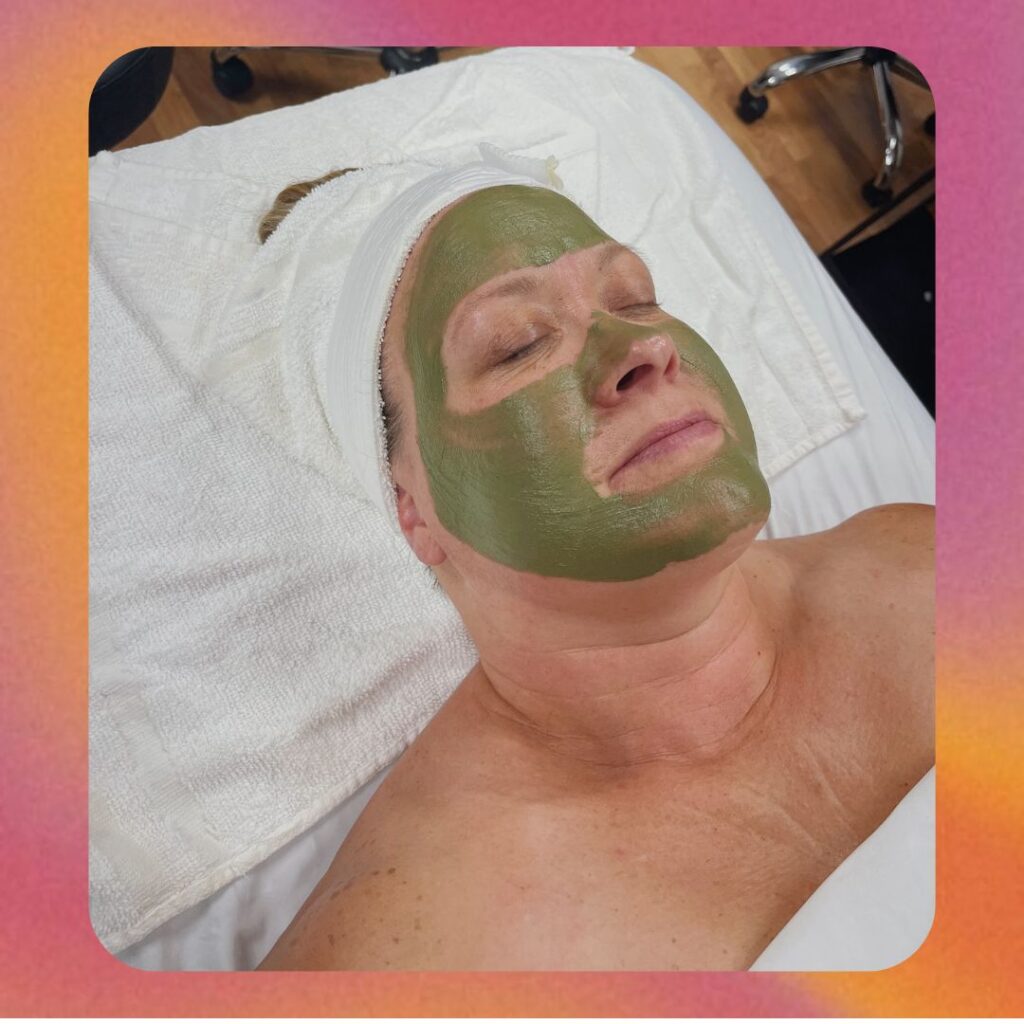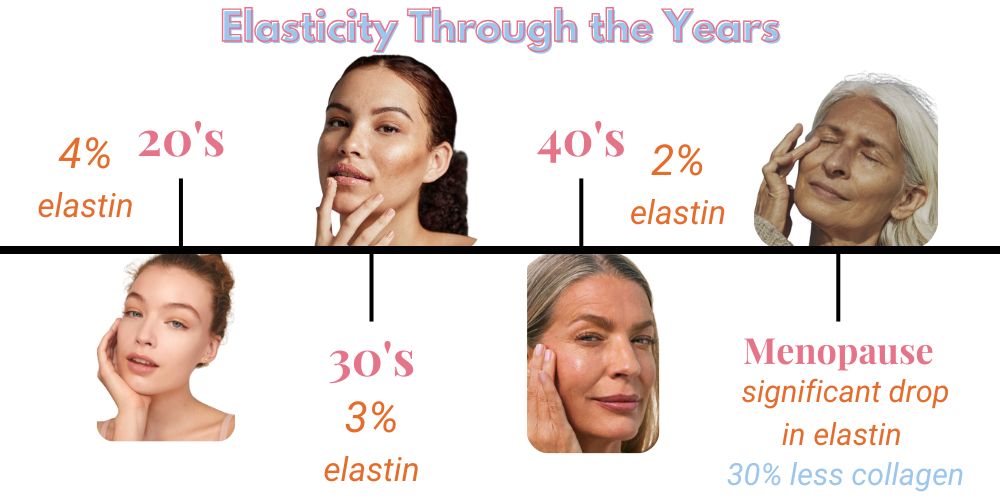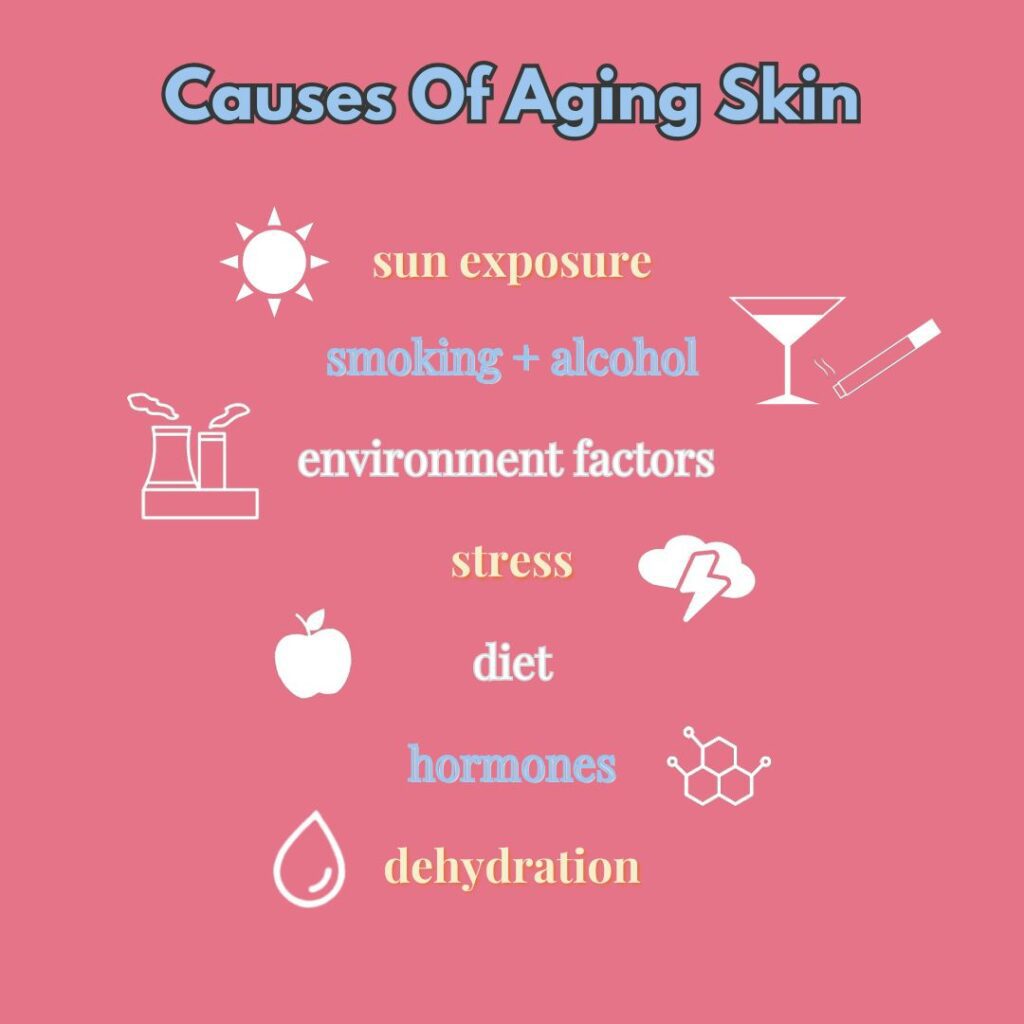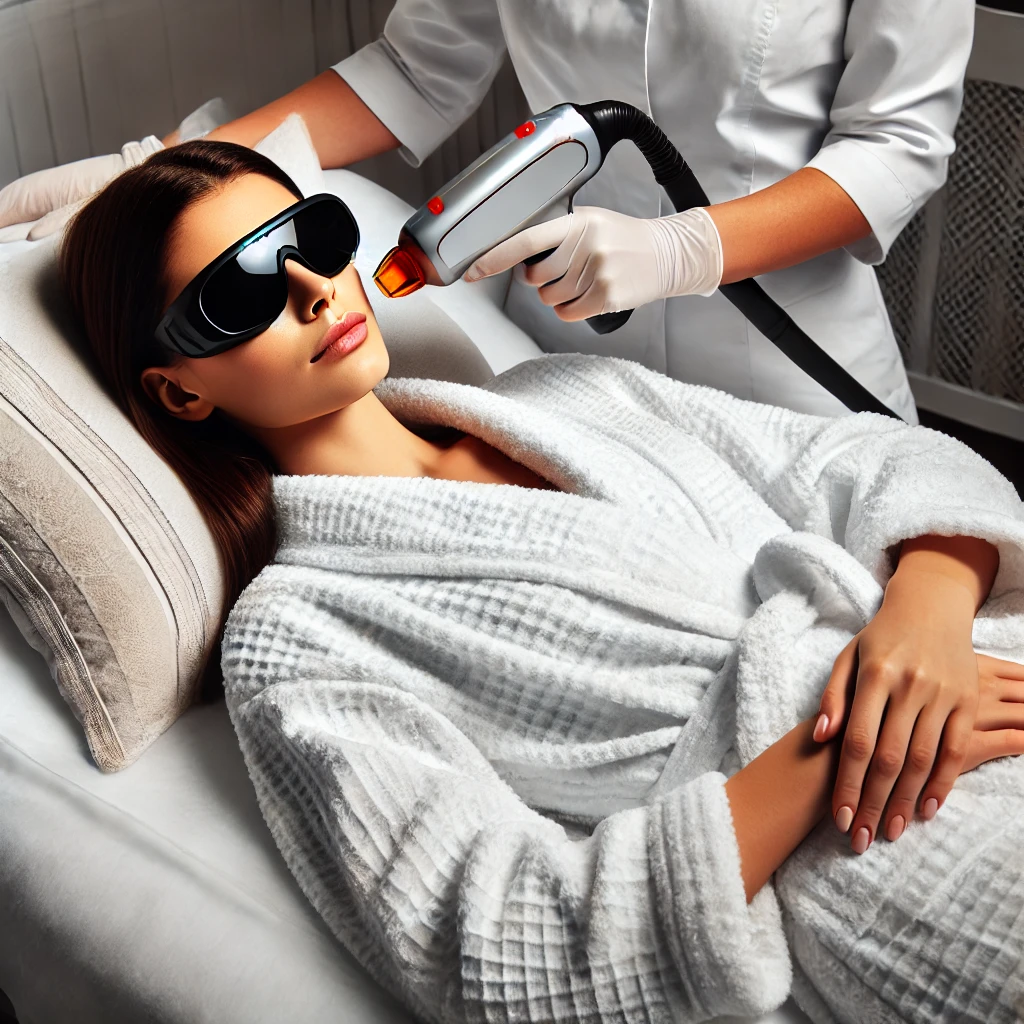Causes and Signs of Aging | Prevention Tips | Anti-Aging Ingredients | Daily Routine | Professional Treatments

Know the secret to youthful skin at any age! Well, there isn’t one solution that is one-size-fits-all, but there are key components that will help you get the results you want! Anti-aging skincare is about more than just reducing wrinkles; it’s about maintaining healthy, resilient skin over time. Aging is a natural process, but with the right skincare for aging skin, you can maintain youthful and radiant skin. Whether you’re looking to reduce visible signs of aging or taking wrinkle prevention measures, this comprehensive guide will break down the fundamentals. You’ll understand the science behind aging skin as well as the most effective ingredients and best anti-aging practices to achieve your desired skin goals.
How Does Our Skin Age?
As we age, our skin undergoes various changes, both internally and externally. This process is influenced by biological and external factors that accelerate visible signs of aging. Understanding how and why skin changes over time is crucial to addressing aging concerns effectively. When we can identify the root problem, it is easier to understand how we can combat it.
Key Biological Processes Behind Aging:

- Collagen Loss:
Collagen is a protein that provides structure and firmness. It naturally declines by about 1% per year after the age of 25. As collagen production slows down, skin becomes less firm, leading to sagging, fine lines, and wrinkles. This is one of the primary reasons for the visible signs of aging. - Loss of Elasticity:
Elastin is also a protein but it is responsible for the skin’s flexibility, and also decreases over time. The lack of elastin means that skin doesn’t bounce back as easily, causing it to lose its youthful “bounce” and become more prone to sagging and wrinkles. - Decreased Hydration:
As skin ages, its ability to retain moisture diminishes. This decreased hydration leads to a dull, rough appearance and exaggerates the appearance of fine lines and wrinkles. Skincare for aging skin should prioritize hydration to maintain elasticity. - Thinning Skin:
The epidermis (the outer layer of skin) becomes thinner and more fragile with age. This thinning makes the skin more susceptible to damage like wrinkles and fine lines. - Slower Cell Turnover:
The rate at which skin cells renew slows down as we age. This results in a buildup of dead skin cells on the surface, leading to a dull and uneven skin tone. Slower cell turnover also impacts how quickly skin can repair itself from damage.
Environmental and Genetic Factors:
Aging is influenced by both intrinsic (genetic) and extrinsic (environmental) factors. While you can’t change your genetics, you can certainly minimize the impact of environmental factors.
Intrinsic Factors (Genetic):
- Genetics: Your genes play a significant role in how your skin ages. Some people are naturally predisposed to develop wrinkles earlier, while others may retain more youthful skin well into their older years.
- Hormonal Changes: Hormonal shifts, especially during menopause, can significantly impact skin aging by affecting moisture levels and the thickness of the skin.
Extrinsic Factors (Environmental):
- Sun Exposure (UV Radiation): UV exposure is the most significant environmental factor in premature aging also known as photoaging. It accelerates collagen breakdown that leads to the formation of dark spots and damages the DNA in skin cells which then increases the risk of skin cancer. Daily sunscreen use is essential for wrinkle prevention. Remember when we talked about maintaining hydration in the skin? Ultraviolet exposure is known to make the skin dehydrated so even more reason to be wearing your spf!
- Pollution:
Free radicals are unstable molecules that cause oxidative stress and damage skin cells. Air pollution exposes the skin to free radicals. Exposure to this overtime leads to dullness, fine lines, and loss of elasticity. This factor can also change depending on the season. Being aware of the environment and how your skin reacts to it is key to catering your routine to what your skin is needing. - Lifestyle Factors:
- Smoking: Smoking reduces blood flow to the skin which results in a washed out complexion and loss of firmness. It also depletes the skin of essential nutrients and accelerates collagen breakdown.
- Diet: A diet lacking in essential nutrients, particularly antioxidants, can make skin more susceptible to damage from free radicals. Eating a balanced diet rich in vitamins and antioxidants supports skin health from the inside out.
- Dehydration: Not drinking enough water leads to dehydrated skin, which can appear dry and more prone to wrinkles.
- Stress: Chronic stress increases cortisol levels, which can break down collagen and elastin, leading to premature aging.
- Lack of Sleep: Sleep is when the skin undergoes its repair processes. Poor sleep quality affects the skin’s ability to regenerate, resulting in dullness and an increase in fine lines.
Prevention Tips: How to Slow Down Aging
Prevention is key when it comes to best anti-aging practices. Here are practical tips to protect your skin and slow down the aging process:

- Wear Sunscreen Every Day:
UV exposure is the leading cause of premature aging. Apply SPF 30+ every morning, even on cloudy days. UV rays are always present no matter the weather. - Maintain a Healthy Diet:
A diet rich in antioxidants (berries, green tea) and Omega-3 fatty acids (found in salmon and nuts) supports skin elasticity and fights free radical damage. Adding in any supplements like zinc or omega-3 help with overall skin health. - Stay Hydrated:
Drinking enough water helps maintain skin hydration and elasticity. Keep alcohol to a minimum as it will dehydrate your skin. - Get Enough Sleep:
Poor sleep can accelerate signs of aging, including dark circles and fine lines. Aim for 7-9 hours of quality sleep each night, whatever is optimal for you. - Manage Stress:
Practice stress management techniques such as meditation or yoga to keep cortisol levels in check and reduce the impact of stress on your skin. Mental health plays a big role to what our skin appears on the outside.
Want to know the best sunscreens for anti-aging? Read our post: Is Sunscreen the Secret to Anti-Aging? Here’s Why You Need It Daily.
Fundamental Anti-Aging Ingredients
The foundation of an effective anti-aging skincare routine lies in choosing the right ingredients for your skin. These ingredients target the core issues associated with aging skin, such as loss of elasticity, dehydration, and damage from environmental factors.
- Retinol (Vitamin A Derivative):
Retinol is one of the most researched and proven anti-aging ingredients. It boosts collagen production, accelerates cell turnover, and helps reduce the appearance of fine lines, wrinkles, and hyperpigmentation. Be sure to use retinol at night, as it can make the skin more sensitive to sunlight. There might be products out there that say they are a retinol cream or retinol serum, looking at the ingredient deck is crucial here. The higher the ingredient is in the list, the more of it is in the product. You want to be sure to find a product that is results driven and effective. - Vitamin C:
A potent antioxidant, Vitamin C neutralizes free radicals, brightens skin tone, and reduces dark spots. It works well when applied in the morning, especially under sunscreen, to protect the skin from environmental damage. Some products that claim to have vitamin c are irritating or ineffective. Choosing a medical grade product will give you the results that you are trying to achieve. Don’t underestimate a good vitamin c! - Peptides:
Peptides are small chains of amino acids that stimulate collagen and elastin production. They improve skin elasticity and firmness, helping to minimize the appearance of fine lines. Leaving peptides on your skin through the entire day will ensure the ingredient can fully soak into the skin. - Hyaluronic Acid:
Known for its ability to retain water, hyaluronic acid hydrates the skin, giving it a plump appearance. It helps reduce fine lines caused by dehydration and is suitable for all skin types. There are so many hyaluronic acid products out there. Some better than others, find one that fits in your budget and works best for your skin. - Niacinamide:
Niacinamide, or Vitamin B3, reduces inflammation, minimizes the appearance of pores, and enhances the skin’s barrier function. It’s excellent for improving skin texture and reducing redness. Some people cannot use niacinamide due to allergies. An alternative would be hyaluronic acid. Certain AHA’s will give you the benefit of reducing the appearance of pores, etc like niacinamide. Be sure to consult a professional if you are having irritation or have questions about what is best for you. - Antioxidants:
Antioxidants protect the skin from free radical damage. They help prevent the breakdown of collagen and elastin, slowing down the aging process. Antioxidants help prevent signs of UV ray related aging. Using these daily will prevent further damage along with spf for optimal prevention. - Alpha Hydroxy Acids (AHAs) & Beta Hydroxy Acids (BHAs):
AHAs and BHAs are chemical exfoliants that remove dead skin cells, revealing smoother, brighter skin. They are effective for treating acne, uneven skin tone, and fine lines. AHA’s are great day time exfoliators if you are needing something more. If you are not wanting to get started on retinol as an exfoliator, using an aha or bha is a good alternative for acne related issues. Be sure to consult a licensed esthetician for custom advice. - Ceramides:
Ceramides are lipids that restore the skin’s barrier, preventing moisture loss and protecting against environmental damage. They are essential for maintaining hydrated, resilient skin. Ceramides help maintain the skin’s natural barrier by essentially “gluing” skin cells together, helping to lock in moisture and protect the skin from irritants. - SPF (Sunscreen):
Daily sunscreen application is the most effective way to prevent premature aging. It protects the skin from UV rays, reducing the risk of wrinkles, dark spots, and skin cancer. Spf should be worn whether you are inside or outside, sunny or cloudy. Spf protects from uv damage, a key part to wrinkle prevention. - Growth Factors:
Growth factors are proteins that encourage cell regeneration and repair. They help improve skin firmness, elasticity, and overall appearance.
For more insight into anti-aging ingredients, check out Top 10 Anti-Aging Ingredients that you need to know about.
Daily Anti-Aging Routine
An effective routine is the backbone of anti-aging skincare. Here’s a step-by-step guide for both morning and nighttime routines:
Morning Routine:
- Gentle Cleanser:
Start with a gentle cleanser to remove overnight buildup without stripping the skin’s natural oils. - Antioxidant Serum (Vitamin C):
Apply a Vitamin C serum to protect against environmental damage and brighten the skin. - Moisturizer:
Choose a moisturizer that hydrates and strengthens the skin barrier. Pick one that works best for your skin type. - Sunscreen (SPF 30+):
Sunscreen is the most crucial step for wrinkle prevention and any skincare routine. Apply generously every morning, even on cloudy days. SPF in your makeup is not enough. You have to apply 7x the amount of makeup to get enough protection. Spf is not to be mixed with another product. Find your favorite spf product and make it a habit of applying it every morning!
Nighttime Routine:
- Double Cleansing:
First cleanse is to remove any leftover makeup, spf, dead skin, build up, etc. The second cleanse is to target any skin concerns and actually cleanse the skin properly. - Retinol or Peptides:
Use a retinol or peptide serum to promote skin renewal and boost collagen production overnight. - Hydrating Moisturizer:
End with a hydrating moisturizer to lock in moisture and repair the skin barrier. Using a moisturizer at night will help keep transepidermal water loss to a minimum that inevitably occurs.
Want to tailor your routine for different skin types? Read more on preventing wrinkles at any age.
Advanced Anti-Aging Treatments
For those looking for more intensive solutions, professional treatments can significantly enhance the results of your anti-aging skincare routine. Here are some advanced options:

- Chemical Peels:
Chemical peels exfoliate the top layer of skin, improving texture and tone. They are effective for fading fine lines, wrinkles, and hyperpigmentation. No matter your specific skin concern, there is a peel to target it. Be sure to go to a trusted professional before receiving a chemical peel. - Laser Resurfacing:
Laser treatments use controlled heat to stimulate collagen production, reducing deep wrinkles and tightening the skin. Technology has advanced and there are many options of different laser treatments to get done. Consult a reliable medical spa or clinic to receive this type of treatment. - Microneedling:
Microneedling is a controlled damage to the skin that triggers the skin’s natural repair processes. It enhances the absorption of skincare products, including anti-aging serums, and stimulates collagen production. Being consistent with this treatment will help it be more effective.
Interested in professional treatments? Learn more about when to consult an expert in our blog post: How to Prevent Wrinkles at Every Age.
Aging is inevitable, but taking the right steps can keep your skin healthy and glowing at any stage of life. From choosing the best anti-aging practices to building a solid skincare for aging skin routine and considering advanced treatments, consistency is key. Remember that staying consistent will give you the best results possible. Start today, it’s never too late to begin.
Ready to glow? Let’s start this skincare journey together!
Follow on Instagram @saltycoveskin